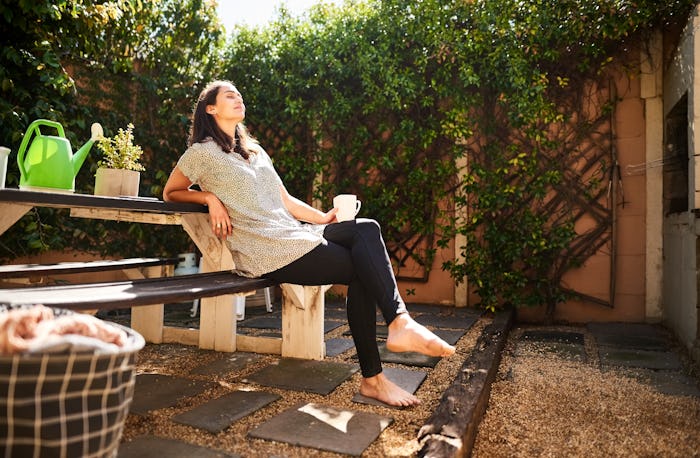Parenting

Why Sometimes *You* Need To Have A Timeout
Honestly, it might be even better than sending your kid to timeout.
I love my 2-year-old more than life itself. I really do. But sometimes I just can’t deal with another fight over something simple, like putting on pants, eating chicken, or messing with the dogs. Toddlers are the best, but also kind of the worst, and so exhausting. Lately, especially with quarantine causing everyone to be around their kids 24/7, I think timeouts are essential for parents, too. I wish someone would tell me to go sit in a corner to take a breather before I lose my cool. In fact, taking a timeout may even make me a better, calmer, and more present parent. (And it's probably easier than forcing a toddler into timeout.)
Licensed therapist and family counselor Katie Lear emphatically tells Romper, “Parents need timeouts as much as children! Taking a break helps everyone to get their feelings under control so they can make better choices, and not say or do something they'll regret later. Sometimes just pausing the argument makes it better.” Dr. Leela R. Magavi, a child, adolescent and adult psychiatrist agrees, and says that parents deserve time to process their own experiences and work on themselves in order to remain fully present with their children.
It’s also important to step away from a stressful situation with your child (when it’s safe of course) so you can calm down in order to help children manage their own frustrations. “Even really little kids have a pretty uncanny sense of when their parents are angry or stressed. It's really hard for a child to self-regulate in the presence of a parent who is emotionally overwhelmed. Anything you can do to calm yourself will help your child, too,” Lear says.
“Parents’ facial expressions, hand gestures, speech latency and tone in addition to various other factors can directly affect children,” says Magavi. “Mindfulness activities and timeout to alleviate anxiety would help parents and their children.” She says that children of all ages are impressionable and innately intuitive, so if you're riled up, your children can become distressed, making the entire situation more fraught.
I remember when my son was going through some sleep issues when he was 4 months old, and he would sleep in 20-minute increments day and night for two months straight. I remember I just had to leave the room sometimes because I was screaming and crying along with him to please just go to sleep, and I needed a timeout to collect my thoughts and calm down my frustrations. I ended up standing on the porch for a timed three minutes away from the crying.
Taking a timeout for yourself could also prevent you from getting so frustrated that things can turn aggressive quickly, and it’s important to take a step back and take a breath. “I always recommend against physical discipline, as this could reinforce negative behavior and cause children to respond to difficult situations with anger and frustration,” says Magavi.
"We have a lot of good research now that shows that kids who are spanked develop more aggressive behavior and have more emotional difficulties later in life," Lear says. "Protecting your own mental health is one of the best things you can do for your child's wellbeing, and if that means a timeout, so be it."
So parents, when it's safe to do so, take that timeout to gather your thoughts, calm down, and take a deep breath. You’ll be able to handle the situation much better, and your child won’t emulate your stress and anger back to you. Whether that's a mini break on your front porch, or a quick walk down the driveway, take a few minutes to let your emotions regulate.
Experts:
Katie Lear, LCMHC, RPT, RDT, counselor, play therapist, drama therapist.
Dr. Leela R. Magavi, M.D., a Hopkins-trained child, adolescent, and adult psychiatrist and Regional Medical Director for Community Psychiatry.
This article was originally published on